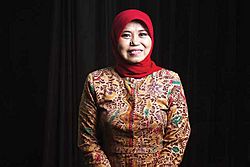Tri Mumpuni facts for kids
Quick facts for kids
Tri Mumpuni
|
|
|---|---|
 |
|
| Member of National Research and Innovation Agency Steering Committee | |
| Assumed office 13 October 2021 |
|
| President | Joko Widodo |
| Head of Steering Committee | Megawati Soekarnoputri |
| Personal details | |
| Born | August 6, 1964 Semarang, Central Java, Indonesia |
| Political party | Independent |
| Spouse | Iskandar Budisaroso Kuntoadji |
| Alma mater | Bogor Agricultural Institute University of Costa Rica Chiang Mai University |
| Occupation | Independent researcher, social entrepreneur, philanthropist, social activist, and micro-hydropower inventor |
| Website | http://3.ibeka.or.id/wp/index.php/en/home/ |
Tri Mumpuni, also known as Bu Puni (which means Mrs. Puni), is an amazing Indonesian researcher and inventor. She is known for creating small hydropower systems. These systems help bring electricity to many people in Indonesia. She is also a social entrepreneur, which means she starts projects to help communities. Plus, she is a philanthropist, someone who helps others by giving money or time.
In 2010, she joined the National Committee on Innovation. For her important work, she received the famous Ramon Magsaysay Award in 2011. This award is like Asia's Nobel Prize. In October 2021, she was chosen to be a member of the Steering Committee for the National Research and Innovation Agency (BRIN).
Early Life and Education
Tri Mumpuni was born in Semarang, Indonesia. Her father worked for a government-owned company. Her mother had studied home economics. Her mother often helped people in their village. She helped them with skin problems caused by unhygienic conditions.
From her parents, Puni learned a lot about helping others. She wanted to become a medical doctor to help villagers.
In 1982, the Indonesian Institute of Sciences held a science competition for young people. Puni won this competition. One of the judges, Professor Andi Hakim Nasution, was very impressed by her work. He was a professor at Bogor Agricultural Institute (IPB).
When Puni's application to study medicine was not accepted, Professor Andi heard about it. He found her and offered her a chance to study at the Faculty of Agriculture at IPB. She joined the Department of Agricultural Social and Economy and finished her studies in 1990.
After graduating, she continued her education. She earned a Master's degree in Energy and Sustainable Development from the University of Costa Rica in 1992. She also got a Master's degree in Trade and Sustainable Development from Chiang Mai University in 1993. She also took special courses on leadership for the environment.
IBEKA and Hydropower
Later, Tri Mumpuni met her husband, Iskandar Budisaroso Kuntoadji. He was a geological engineer. He had learned how to build small hydropower generators in Switzerland. Her husband had started a non-profit group in 1987. But it was hard for him to make progress because he didn't have enough resources.
Puni realized that her husband's idea was very helpful. His hydropower designs were perfect for remote areas in Indonesia. These areas had enough water but were hard to reach. So, she changed her focus from providing affordable homes to building micro-hydropower systems.
On August 17, 1992, she and her husband started a new organization. It was called the Institute of Business and Economic Affairs (IBEKA). It is a non-profit group. Puni became the Director, and her husband became the Chairman. As of 2021, IBEKA has built 61 micro-hydropower generators. These generators provide electricity to 65 villages in Indonesia and one village in the Philippines.
Awards and Recognition
Tri Mumpuni has received many awards for her work:
- She was named a Climate Hero by the World Wildlife Fund (WWF) in 2005.
- She became an Ashoka Fellow in 2006.
- She was recognized as one of the 99 Most Powerful Women in Asia.
- She received the prestigious Ramon Magsaysay Award in 2011.
- She won the Ashden Award in 2012.
- In 2021, she was named one of the 22 Influential Muslim Scientists. She was also listed among the 500 Most Influential Muslims by The Muslim 500.
 | Victor J. Glover |
 | Yvonne Cagle |
 | Jeanette Epps |
 | Bernard A. Harris Jr. |

